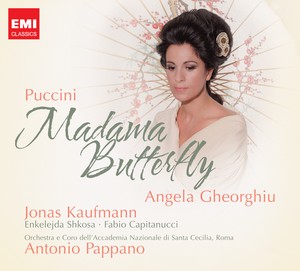|
|
|
|
|
|
|
|
| Opera News, 5/2009 |
| IRA SIFF |
|
|
|
Madama Butterfly |
|
 The
success of a Butterfly performance — whether on disc or in the opera house —
comes down to the protagonista, who remains onstage almost the entire time,
from her entrance on, and never stops singing. Angela Gheorghiu, an
exclusive EMI recording artist who has yet to sing Cio-Cio-San onstage, is
the prime attraction in this new set, which joins an EMI company catalogue
already boasting classic performances starring Maria Callas, Victoria de los
Angeles and Renata Scotto. The
success of a Butterfly performance — whether on disc or in the opera house —
comes down to the protagonista, who remains onstage almost the entire time,
from her entrance on, and never stops singing. Angela Gheorghiu, an
exclusive EMI recording artist who has yet to sing Cio-Cio-San onstage, is
the prime attraction in this new set, which joins an EMI company catalogue
already boasting classic performances starring Maria Callas, Victoria de los
Angeles and Renata Scotto.
Happily, one can report that Gheorghiu is in excellent voice here, and she
finds in this role a congenial persona, one that encourages the best in her
singing. One might question Gheorghiu's ability to tackle this part with her
rather light instrument, but I don't see it that way. Many light voices have
triumphed in this role — among them Scotto, a Gilda and a Lucia; Toti Dal
Monte; Licia Albanese; Dorothy Kirsten; and Geraldine Farrar, the first
Cio-Cio-San at the Met — but all of these ladies seem to have favored
forward vocal production, with vivid word coloration. Gheorghiu's recent
Puccini efforts at the Met have been delivered in a voice produced in the
back of the throat, with a muffled quality in the middle register and nary a
forward vowel. As Cio-Cio-San, Gheorghiu is encouraged to project youth and
ingenuousness, and the means by which she achieves this encourage a vocal
approach far more suitable to operas of this period, and of Puccini in
particular. Words are stressed through the opening of vowels, and line is
achieved without the sacrifice of text.
Gheorghiu offers a detailed portrayal, trying to balance a bit of the voce
bianca approach with her full, darker sound. She does not make the choice to
use a "baby voice" in Act I and then abruptly "mature" after that but
remains touchingly delicate for the rest of the opera, her voice only
occasionally taking on a darker, more guttural quality. The entrance is
beautifully sung, although the optional D-flat is managed successfully
rather than floated; "Ieri son salita" is less than hypnotic, but the love
duet features many lovely moments. "Un bel dì" is sensitively narrated and
superbly vocalized, but "Che tua madre" is a bit short on impact and, like
the death scene, could benefit from performing experience in the role.
(There are apparently no plans for that.) Still, for a first reading this is
a very fine effort.
The supporting cast is strong. Jonas Kaufmann is sensitive to the text
and offers abundant musical nuance, but one wishes the tenor had a bit more
youthful squillo in his voice: its baritonal quality is at odds with
Pinkerton's callow nature and compromises some of the vocal moments that cry
out for a tenorial ring. Fabio Capitanucci is a superb Sharpless —
stylish, sympathetic and with a handsome sound, dark enough to nearly
balance Kaufmann. Enkelejda Shkosa is dramatically alert as Suzuki but
sounds somewhat tremulous through much of the role — one that, it must be
said, is not the most grateful of "sings" for most mezzos. In the smaller
roles, standouts include Gregory Bonfatti, as Goro, and Roberto Valentini,
who makes the most of Yamadori's sumptuous lines. Raymond Aceto, a fine bass
with a powerful voice, has presence to burn as the Bonze.
Antonio Pappano is a favored collaborator of the diva's, and a musician
whose recorded performances are often notable for their excellent pacing and
wonderful orchestral color. It's no surprise that the Act II, Scene 2
prelude is stunning. Elsewhere, the maestro draws theatrical colors from the
orchestra, balancing the intimate with the showy. Gheorghiu fans will be
certain to want this, but the 1966 Scotto set, conducted by John Barbirolli,
remains the prime recommendation for those seeking a first Butterfly for
their CD collections. |
|
|
|
|
|
|
|
|
|
|
|
|
|
|
|
|
|
|